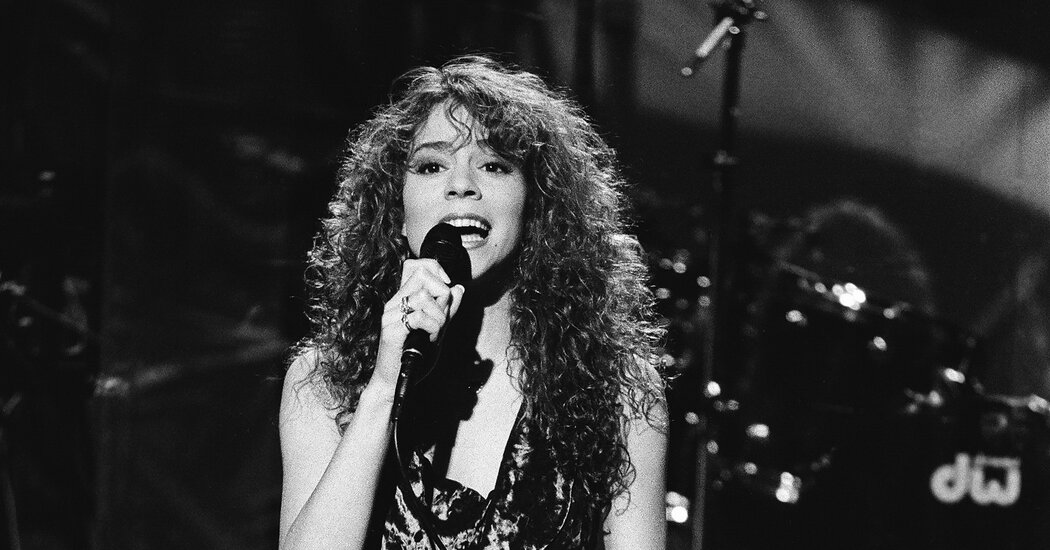

On the rainy night in the mid-1990s when Mariah Carey first kissed Derek Jeter — a tentative step away from her suffocating marriage to Tommy Mottola, the music mogul who had been crucial to building her career — the singer, drenched, returned to her waiting limo and turned on the radio. What she heard was the “grimy, dangerous, sexy-ass beat” of Mobb Deep’s “Shook Ones Pt. II,” one of the crucial New York rap statements of all time, the sort of desolate song that can drop the temperature 20 or 30 degrees in an instant.
The track was stuck in her head when she got back to the palatial home she and Mottola had built together in Bedford, N.Y., Carey writes in her new memoir, “The Meaning of Mariah Carey.” The next day, she started working on a song based on a sample of “Shook Ones” that told her story of going romantically rogue. “The Roof (Back in Time)” is both rugged and sensual — Carey cooing over a sample of Prodigy jabbing, “I got you stuck off the realness.” It was a product of its era, in which pop, R&B and hip-hop were all beginning to loosely commingle — soon it would be the norm.
“The Roof” appeared on Carey’s fifth album of original songs, “Butterfly,” in 1997, a propitious moment in her life and music. Carey, the pop-soul megastar with the most impressive voice of her generation (Whitney Houston, for these purposes, was in the prior one), was deepening her connections to hip-hop right as it was fully emerging as the pop culture lingua franca. Carey the embattled and surveilled wife was catching her first glimpses of romantic and sexual freedom. And Carey, the daughter of a Black father and a white mother, who had been the target of racist taunts in her childhood (“like a first kiss in reverse: each time, a piece of purity was ripped from my being”) and was urged do play down her Blackness by her music business partners, was announcing who she was loud and clear.
For Carey, all of these vectors — professional, personal, romantic, creative, racial, familial — intersected and often overlapped, and had since her childhood. “The Meaning of Mariah Carey” tells that story vividly and emotionally and, for long stretches, unblinkingly. It is a memoir about a determined and preternaturally talented artist focused on her craft long before she’d captured the world’s eyes and ears, and also about a young woman foiled at almost every turn when trying to feel secure in her identity.
Her musical gift — the only sturdy thing — provided a beacon of hope as family turmoil wrecked her childhood. It also saw her through a traumatic marriage to Mottola, who she said effectively imprisoned her in their upstate home and smothered her with security guards, even as she became one of the biggest pop stars on the planet.
But while music was a retreat for her, it was a source of confusion to others. “Most labels didn’t really get me,” Carey writes about her early years seeking a record deal in New York. “My demo was more diverse than the music industry at the time.”
This caused problems with Mottola. “Tommy and I were completely different, and the Black part of myself caused him confusion,” she writes. “From the moment Tommy signed me, he tried to wash the ‘urban’ (translation: Black) off of me.”
The arc of Carey’s career demonstrates the sheer deafness of this approach. She brought rich soul conviction to her early ballad smashes — “I Don’t Wanna Cry,” “Hero,” “One Sweet Day” — that rescued them from treacle. And of all the forays into hip-hop by pop stars of her generation, hers were the most convincing, the most fluid and becoming. The remix of “Fantasy,” her Ol’ Dirty Bastard collaboration from 1995, was a crucial turning point in hip-hop’s absorption by pop. Here again, romantic, creative and racial tension collide — Carey played the song for Mottola and, she writes, it “scorched our pristine white bedroom with the grime and righteous fun I’d been craving!” Mottola hated it.
Once Carey began regularly working with hip-hop producers like Jermaine Dupri, she made some of the most creatively successful music of her career while remaining at the top of the charts: “Always Be My Baby,” “We Belong Together,” “Heartbreaker,” “I Know What You Want.”
This is a full-circle triumph for Carey, who had been anxious about race since childhood. Her mother had been all but disowned by her family for marrying a Black man. Early in the book, Carey suggests that her older siblings resented her because of her fair complexion, suspecting that she was passing for white. This recurs throughout her life, leaving Carey vexed. In fact, at the Giorgio Armani dinner where Carey first met Jeter (a few weeks before their tryst), there is an open conversation about whether Carey’s Blackness is visible at all. Key to her attraction to Jeter that night is her learning that he, too, has a Black father and a white mother.
The writing in this book — by Carey with Michaela Angela Davis — is arresting, a little soft-bellied, decidedly human. Carey is rendered as much a spiritual force as a musical prodigy — resilient, self-aware, and also funny, in her regal way. The memoir’s first sentence — “I refuse to acknowledge time, famously so” — is *chef’s kiss*. There are plenty of dahlings sprinkled throughout. Also, Carey pointedly pulls out an “I don’t know her” omission of Jennifer Lopez’s name when discussing how Mottola sought to craft Lopez in Carey’s image, and blows a little shade Madonna’s way: “I could emulate the popular Madonna studio technique, but with my voice alone.”
If Carey presents herself as singular, so be it. She has almost no peer in terms of long-running commercial success — she has the most No. 1 Billboard hits of any artist save the Beatles. And if the rigor and chutzpah of that presentation is the extension of a lifetime of maintaining rigid poise in the face of horrific circumstances, that is impressive fortitude. She recounts the story of her first visit with an acting coach, who asked her to envision a safe place to mentally retreat. Carey had none: “I was feeling nothing in nowhere. I could only feel the hard floor flat against my back as I searched around in my own emptiness.”
“The Meaning of Mariah Carey” is less revealing the later into Carey’s life it moves. One harrowing section around the 2001 release of the album and film “Giltter” jumps from family-member manipulation to detox facility to corporate malfeasance and beyond, but still feels frustratingly ambiguous. She does not mention the bipolar disorder diagnosis she received at that time and publicly revealed in 2018. And the final chapters of the book are hurried, crashing through diva duets, Karl Lagerfeld memories, and Carey’s eight-year marriage to Nick Cannon and the twins they share, Moroccan and Monroe.
Carey’s focus is resolute — her music is the product of her life. A protective cloak when needed, and the place where she quietly revealed her dark truths for everyone to hear, even if they couldn’t fully understand. (She weaves particularly poignant lyrics throughout — songwriting is just as important to Carey as singing, sometimes more so.)
Carey also just issued “The Rarities,” a collection of previously unreleased songs dating back to 1990, which echoes the path her memoir maps out. Beginning with the Jackson 5-esque “Here We Go Around Again,” the album moves toward the sorts of slow-burn-drama R&B ballads (“Everything Fades Away”) that were crucial to her early success, before pivoting toward a more evident hip-hop influence in the mid-90s (“Slipping Away”). Many of the songs are strong, but they largely bolster the story Carey has long been telling.
The more revealing document, however, might be the second disc of the release: “Live at the Tokyo Dome,” her first concert in Japan, recorded in 1996. This is Carey at the peak — one of the peaks, at least — of her vocal authority and pop fame. She is in phenomenal form: “Emotions” is frisky and cheering; her rendition of “I Don’t Wanna Cry” preserves the original’s bombast while making it just a touch more grounded and unctuous; “Vision of Love,” “Hero” and “Anytime You Need a Friend” are a cathartic one-two-three punch of power, swing and grace.
In the years after this, Carey would wriggle out from under Mottola’s thumb, delve deeper into hip-hop, have her first bust (with “Glitter”) and begin to melt under public scrutiny. Her fame remained intact, but it became more complicated and chaotic. Viewed through that lens, and in the context of what she reveals in her memoir, this concert performance feels like a valedictory for how she once did things, the culmination of a lifetime of singing through clenched teeth. A metamorphosis was coming.